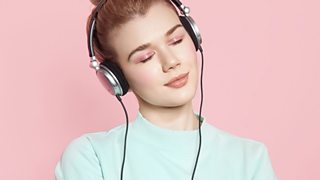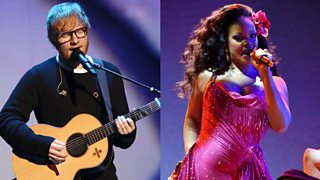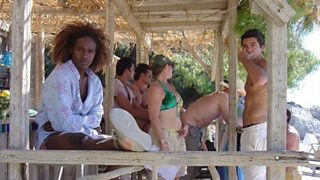Should we let ‘market forces’ decide how many women are on festival line-ups?
Over the past 12 months, there’s been a movement towards getting more women on the line-ups at festivals and music events.
In 2018, 45 events – including the ´óÏó´«Ã½ Proms and Cheltenham Jazz Festival pledged to achieve a 50-50 gender balance in their line-ups by 2022. Radio 1 DJ Annie Mac – who has been campaigning to get more women into the music business for some time – runs her own festival, Lost and Found, which she's pledged to make gender-balanced. She said she was happy to present an award at this year’s Brit Awards ceremony, where there were "as many females nominated as there are males".
It’s something ´óÏó´«Ã½ Radio 5 Live presenter Nihal Arthanayake dicsussed during his Monthly Music Review. He asked choreographer and former Pussycat Doll Kimberly Wyatt and Capital Xtra presenter Yinka Bokinni whether we should be having quotas, or even women-only line-ups for festivals. Or should it be audience demand that decides?
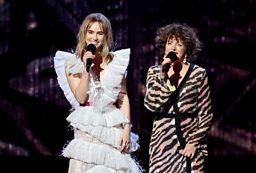
Nihal: Ultimately, it’s a commercial concern. Should a festival just put on the biggest acts?
Yinka: You want to sell tickets. You want the concertgoers and festival goers to have a great time. However, there are plenty of women who are making waves, who do have huge fan bases, and who aren’t just the top three pop stars in the world, who aren't being booked at festivals.
For instance, at Wireless Festival* last year, I was the only woman on the main stage - and I'm a DJ. It felt a bit rubbish to be honest.
I think it's because the business is run by men. And women are either not represented, or they’re under-marketed. Because women can sell out the O2, and women can sell their own shows, so why wouldn't they be added to a festival line-up?

Kimberly: I think that we need some time to level the playing field. I think an awareness of how many great women DJs and artists are out there is needed. We have lived in a male-dominated world when it comes to labels and when it comes to 'getting through' in music. Even myself, as a DJ, I do DJ gigs, and I'm looking at putting together an all female DJ line-up. Because where are they? There are loads of them out there, a lot of them are my friends, but it’s hard to find a good night of female DJs.
Nihal: There are plenty - like Yinka, yourself Kimberley, and Tiffany Calver, of course, has taken over the iconic Radio One Rap Show.
Yinka: And she’s currently touring with Drake.
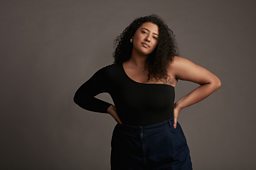
Nihal: You've talked about the system being run by men. So do you think that there is a structural bias, preventing women from performing at these places?
Yinka: Completely. I don't want to be the 'it is getting better' person, but there are small improvements. But for me. I don't think it's enough. I watched the ´óÏó´«Ã½ interview (with the female rappers) and it’s exactly what they were saying - that women have been the video girls or were only cast to be sexy, as opposed to hired to do a job. And I think it has to be the job of women to claw our way into being recognised, and respected. But it’s exhausting. I still get messages asking me to be in someone’s video. Be in my video!
Nihal: Do you feel safe at festivals, as a woman? Do you feel safe to walk around festivals and not be harassed?
Kimberly: I need to be in a group in order to feel safe. Because I think people lose their inhibitions and, those that have bad thoughts or bad intentions, it brings the worst out in them. So, no, not always.
Yinka: No. Even as somebody who is booked to play, I always bring friends who are a lot taller than me and a lot more physically imposing than I am. Even at festivals I'll walk from the stage to get to the backstage bit, and yeah, it’s just blatant harassment. You can't question it. Sometimes you're left thinking: 'Did I overreact? Am I being sensitive?' No, no, no. It'll be people pulling you, physically grabbing you. Especially if they recognise you, they feel they have got some sort of authority over you, or you must stop and talk, even if they're being super intimidating with it.

Nihal: And then accuse you of being stuck up, because you feel intimidated.
YInka: Yeah, and I’m gonna run away!
NIhal: That in itself is a worry, because if you're talking firstly about having more women performing, you certainly have to get something even more fundamental than that right first - which is making sure that women are safe in the first place when they go to festivals.
Ynika: Yeah. I can say wholeheartedly that at every festival I've performed at, I've never been in a place and felt completely secure. There have been moments where I feel fine. I'm talking even from the staff at the venue or the people who are employed to help you.
I remember I was playing the other day, and this well meaning guy was trying to tell me that my headphones were the wrong way round and I was like: 'Go away, I'm booked!'

Nihal: So a lot of mansplaining going on as well?
Kimberly: Totally. I've had similar. They'll just mess with the decks to try and throw you off. Thinking that you won't be able to get it back where it needs to be.
Yinka: Or they’ll change the BPM, and you’ll be: 'Can we put it back to zero, is that all right?!'
Nihal: Is that a regular thing? That you would turn up to a DJ gig and they'll make an assumption that because you're a woman that somehow it's like trying to explain how a car works?
Kimberly: Definitely. It’s quite consistent.
Yinka: Yeah. Or even if I host something, they’ll show me how to turn the mic on :)
*´óÏó´«Ã½ Radio 5 Live contacted Wireless Festival but they didn't want to comment.
-
![]()
Nihal Arthanayake and Laura Whitmore discuss why we seem to stop listening to new music as we get older.
-
![]()
Do you stop your kids listening to certain music?
5 Live's music reviewers explore whether some lyrics are too grown-up for children.
-
![]()
Cast and crew tell ´óÏó´«Ã½ Radio 5 Live what it was like on set.
-
![]()
See more like this
See more articles from ´óÏó´«Ã½ Radio 5 Live.
